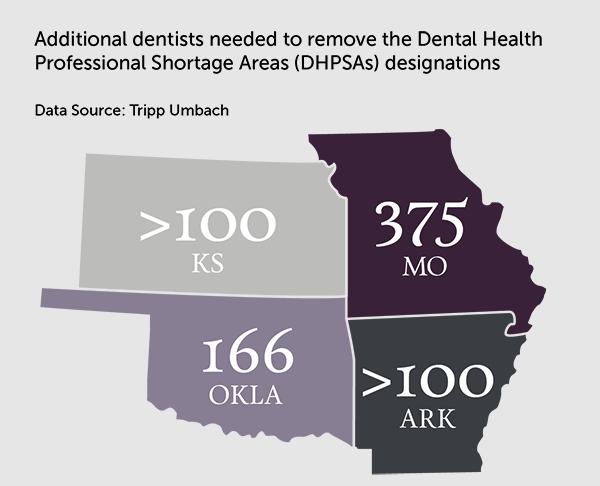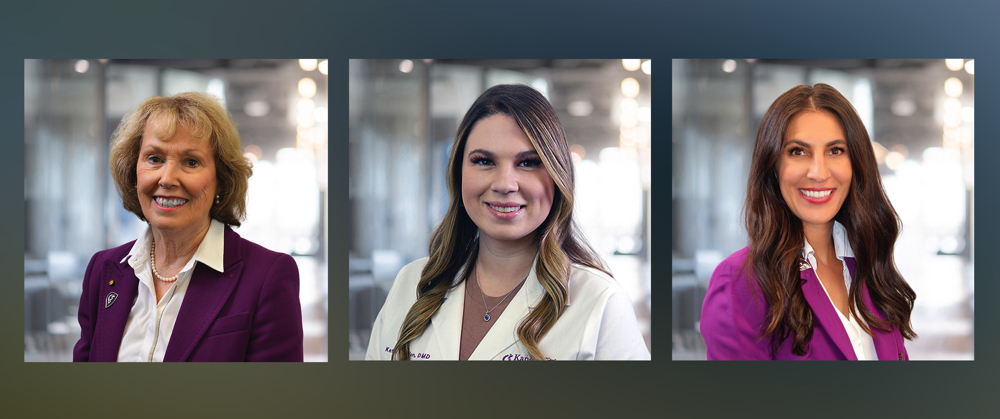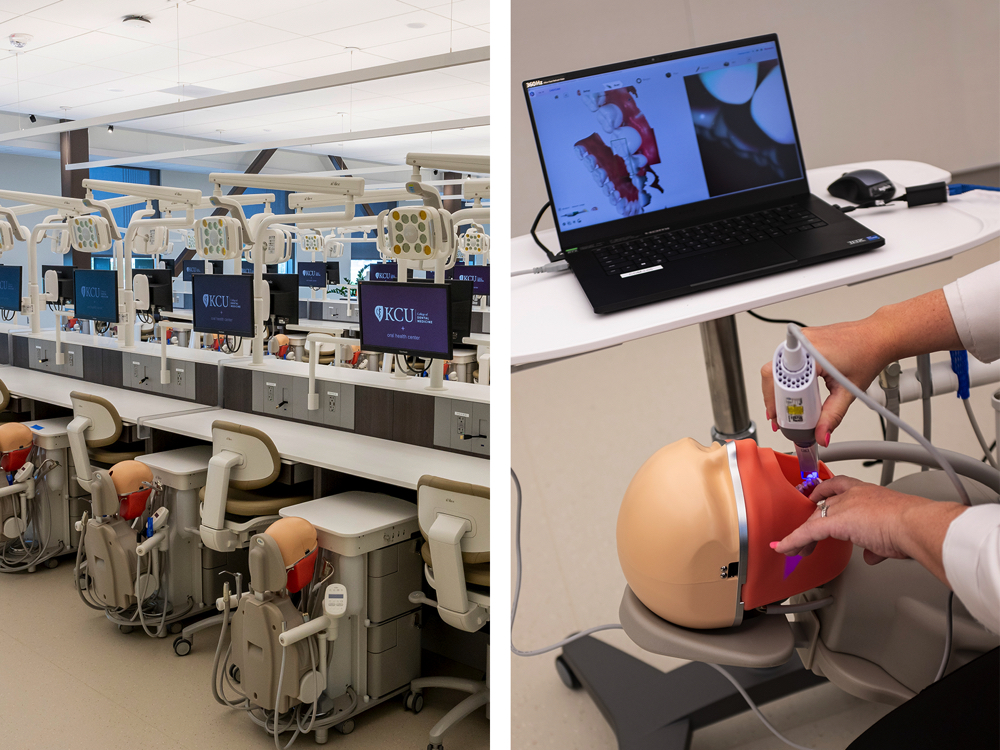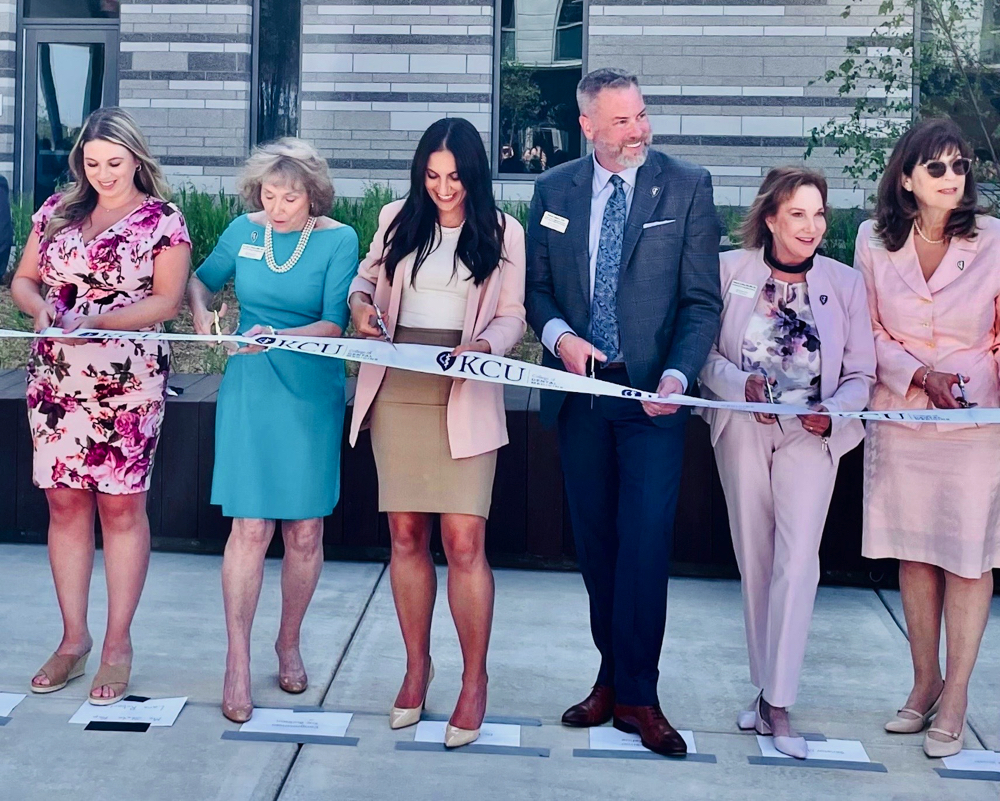In Joplin, Missouri, a group of women that includes Harvard alumnae is creating a new college of dental medicine, helping to bridge a gap that seldom makes headlines: the scarcity of oral health care in rural America.
Across the country, the number of professionally active dentists per 100,000 residents in rural communities is less than half that of urban communities, according to the American Dental Association’s Health Policy Institute; consequently, the access to dental services is substantially lower for those from rural regions. The shortage is especially dire in the four-state region that includes southeast Kansas, southwest Missouri, northeast Oklahoma, and northwest Arkansas. There are no dental schools in Kansas and Arkansas. And the three existing schools in Missouri and Oklahoma are located far from Joplin, which is more than 150 miles south of Kansas City. Almost every county within a 125-mile radius of Joplin qualifies as a “Dental Health Professional Shortage Area” according to the U.S. Health Resources and Services Administration. “Oral health care has tremendous inequities, and the rural population” bears the brunt “of that inequity,” said Linda Niessen, D.M.D.-M.P.H. ’77, M.P.P.-S.D.M. ’82, the founding dean and vice provost for oral health affairs at Kansas City University’s College of Dental Medicine, which celebrated its opening with a ribbon-cutting ceremony on June 26. “By having our dental school in a rural community, we hope to alleviate some of that.”

Additional dentists needed to remove the Dental Health Professional Shortage Areas (DHPSAs) designations
Graphic courtesy of Kansas City University’s College of Dental Medicine
Niessen—who has authored more than 80 peer-reviewed publications and given talks around the world—began her career of advocacy as a commissioned officer in the U.S. Public Health Service’s Divison of Indian Health, serving the Choctaw Nation of Oklahoma in Talihina. She then became a professor and chair of Texas A&M College of Dentistry’s (previously Baylor College of Dentistry) department of public health. During her tenure, she launched and hosted “Dental Health Check,” a 2-minute television news segment on oral health that aired weekly on Dallas-based WFAA-TV. After a decade-long stint as vice president and chief clinical officer for Dentsply International, a global dental manufacturing company, she returned to academia as Nova Southeastern University’s dean and professor from 2013 to 2019. And on March 17, 2020, Niessen was hired to establish the school at Kansas City University (KCU).

Linda Niessen, Katie Champion, Erinne Kennedy
Photographs courtesy of Linda Niessen, Katie Champion, Erinne Kennedy; montage by Harvard Magazine
Three days later, the COVID-19 pandemic shut down the campus and delayed construction for a year. Still, she worked remotely to assemble a team for the project. These “Founding Five” include Niessen; Erinne Kennedy, S.D.M. ’18, M.M.S.C. ’19, the assistant dean for curriculum and integrated learning; Kathryn (Katie) Champion, M.M.S. ’25, the director of clinical operations; Sharon Gordon, the associate dean for academic affairs; and Diane Ede-Nichols, the associate dean for clinical education and patient care. Kennedy said that the group’s members, who come to the new school from a variety of healthcare backgrounds, share a passion “to do something first and to be really innovative.”
“I was working in Massachusetts in an innovative wellness practice, practicing clinically and caring for my patients, when I got that call [from Niessen],” Kennedy said. Following her graduation from Nova Southeastern College of Dental Medicine in 2015, she attended a year-long general practice residency at the VA hospital in Baltimore and received her certificate of completion from Harvard’s School of Dental Medicine in 2018. A year later, she graduated from the University’s School of Dental Medicine with a master of medical sciences and became board certified. Champion graduated from Nova Southeastern College of Dental Medicine in 2018, practiced general dentistry in South Florida for three years, and is now enrolled virtually in Harvard’s Master of Medical Sciences in Medical Education program. She credits Niessen and Kennedy with “paving the way from and to Harvard” and “steering me in the direction of the masters of medical education.”
The endeavor was three-fold: developing the school’s curriculum; conceiving an admissions process; and building the $65-million Harry M. Cornell Dental Education Center (incorporating pedagogical technology such as simulated patients, 3-D printing, virtual reality, and intraoral cameras to scan teeth).

Left: oral health center stations; right: intraoral camera demonstration
Photographs courtesy of Elizabeth Alex
In addition to teaching labs, the new school includes a clinic where students will provide supervised dental services to surrounding neighborhoods. By partnering with community organizations such as the Ronald McDonald House, the Boys & Girls Club, and Head Start, the school aims to serve local populations in need, from the homeless to survivors of domestic violence. As part of its four-year curriculum, the school will also send seniors out on 12-week rotations to community health centers located in rural areas, including Indian Health Service centers. The hope, Champion said, is that these students might “want to go back and practice in those communities. We’re trying to teach clinicians to be competent in all aspects of [dental] care so that they can go into a rural community and be that provider their patients need.”
KCU will be the country’s seventieth college of dental medicine, according to Elizabeth Alex, the school’s senior director of public relations and community outreach. Just 22 percent are led by women, she said. And nationwide, only 36 percent of practicing dentists are women—a disparity the school seeks to help rectify.

The “founding five,” with KCU’s director of predoctoral curriculum and integrated learning, Dennis Abbott, at the ribbon cutting ceremony. Pictured, left to right: Katie Champion, Linda Niessen, Erinne Kennedy, Dennis Abbott, Sharon Gordon, and Diane Ede-Nichols
Photograph by Bret Silvis
Founding the school alongside other women holds special significance for Kennedy, given her own rural upbringing. “There was messaging both direct and indirect that being a dentist or being a doctor isn’t something that I could do,” she said of growing up in Middleport, Ohio—a town of about 2,000 people. Holding the title of assistant dean at KCU is “really an honor because I know the impact that our team of five is making in the lives of all the little girls here in Missouri—they’re able to…see on TV, the news, and [in the] the Joplin Globe that not only are they welcome to become a dentist but the world has many opportunities for them, whether it’s in leadership or academia or research.”
“Generations of both men and women…growing up in the Joplin area” will “see what it looks like when all of these professionals are serving and being a part of the fabric of that community,” Kennedy continued. “For me, it’s just a total 180 [-degree turn] from what I experienced as a child.”
Echoed Champion, “We’re now providing that visibility to the next generation of dentists, that women in dentistry and leadership positions aren't just a myth—it’s an expectation at this point.”
Joplin, with roughly 50,000 residents, will be one of the nation’s smallest cities to have both dental and medical schools (also part of KCU). Local response to both has been overwhelmingly positive, the women report. “It’s been easier opening a dental school in a rural area,” because of “how much support we have within this community,” Champion said. Niessen added that residents are “excited to come use the facilities, asking, ‘Can we get our teeth cleaned? Can we come to the oral health center?’”
On July 31, 80 students—26 percent of whom are from historically underrepresented racial and ethnic backgrounds—will join the school’s inaugural class. Niessen noted that her “Founding Five” team particularly sought students “from rural communities who wanted to go back and make a difference.” The goal is to teach them that “you can have a very fulfilling, rewarding practice and life living in rural America,” she said. “I think we’ve seen the population—the professionals—switch from rural communities to urban areas, but we’re going to try to build it back.”









